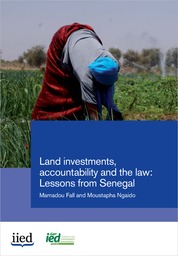Resource information
In Senegal, concern about large-scale land acquisitions has been growing since 2000. Senegalese agriculture has long relied on small-scale family holdings and extensive agriculture. But the current population growth rate, combined with rapid urban development and natural resources degradation, have inevitably changed the game. In order to address the ensuing need for intensification, the government of Senegal has established a political, legal and institutional environment designed to attract agricultural investment, and is taking increasingly radical measures to enable private investors to access agricultural land. Many investors have targeted fertile parts of the country, increasing pressures on resources, often to the detriment of rural people. Against this background, our action research aimed to scrutinise the national legal framework governing land investment, and test in selected sites practical tools enabling people to seize the opportunities for accountability that the law provides. This study finds that there is a need for informed and inclusive national-level debate on tenure and, ultimately, on desirable development models. Over the past few years, a federation of rural producer organisations have made considerable efforts to work with grassroots organisations to make innovative proposals for a new land law that keeps family farming centre stage, while also encouraging private sector investment. Shifts in the government’s policy positions in important areas – for example, through enhanced opportunities for stakeholder consultation – suggest that these efforts are partly paying off. The study further shows that, at the local level, it is important to develop effective arrangements that can clarify the roles and responsibilities of actors, and the lines of accountability between actors, in the context of growing pressures on land. Building on the analysis summarised in this report, our action research is now piloting the development of locally negotiated agreements that establish the rules, systems and safeguards to promote the downward accountability of local leaders vis-à-vis their constituents beyond the electoral ballot. The hope is that, should new private sector investments be initiated, these “local conventions” might provide a more solid, locally grounded basis for making real the legal provisions governing land and decentralisation in rural Senegal.


